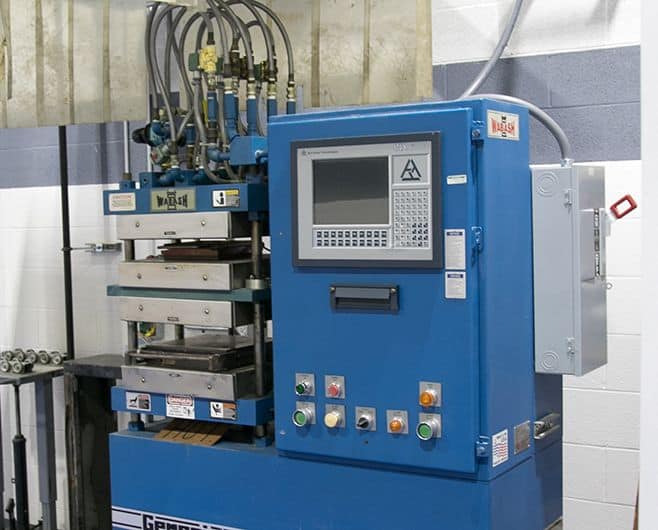
What is Processing Services?
Compound processing services help you optimize your rubber processes for the most efficient manufacturing strategies and high quality products for end user.
Rubber processing typically follows four steps:
- Mastication – an elastomer is sheared and the molecules are broken down to allow for easier flow
- Mixing – additives are incorporated
- Shaping – often by extrusion or molding, the viscous mass is shaped into a useful form
- Curing – the polymer molecules are vulcanized and the shape is fixed
As the rubber industry progresses and new, innovative ways of processing evolve, new challenges also appear. How will your material behave during processing? How will that affect the end product?
Rubber processing testing helps you understand the qualities of your material through the lens of processing and manufacturing. Processing services like extrusion flow analysis, mixing processability tests, and mold flow analysis help you anticipate challenges before they disrupt your manufacturing schedule. These services help save time and money while delivering an excellent polymer product to your customers.
Processing Services at ACE
Looking to enhance your rubber processing? ACE provides rubber processing testing to help you meet your manufacturing goals. Extrusion flow analysis, mixing processability tests, and mold flow analysis ensure your rubber processing goes smoothly, resulting in high quality end products for your customers.
Extrusion Flow Analysis
Extrusion allows manufacturers to create highly customized, uniform, and strong rubber products. An unvulcanized compound is fed into an extruder, which shapes the rubber with pressure. To solidify the shape and render the rubber usable, the extruded rubber is then vulcanized. This can cause shrinkage and changes to the length of rubber extrusion.
Extrusion manufacturing makes it possible to produce high volumes of products at a lower production cost, making it popular for producing profiles, cords, tubing, and gaskets. Without proper preparation and a strategic approach, however, these cost benefits may not be as strong.
Extrusion flow analysis with ACE can help you troubleshoot extrusion challenges to make the most of the process.
Extrusion flow analysis determines the extrudability of unvulcanized styrene-butadiene rubber (SBR) and nitrile rubber (NBR). During extrusion flow analysis, an ACE technician will observe the appearance and contours of the extrusion. You will receive rating systems and recipes for compounds of known extrusion characteristics.
This testing technique includes techniques that account for the differences between extrusion machines for consistent results you can rely on.
Mixing Processability
In testing mixing processability, ACE outlines the specific procedures used to prepare rubber compounds for quality control, research and development, and material comparison. These sheets are prepared in standard molds, which allows rubber specimens to be used in further tests.
Mixing processability references the following details for mixing and compounding rubber materials:
- Types of compounding materials and weighing procedures
- Types of mixing equipment to be used and general mixing procedures
- Types of vulcanization equipment and associated procedures
Mold Flow Analysis
Mold flow analysis provides you with insight into how your polymer compounds will perform during injection molding, extrusion, and other processes scenarios. Depending on the level of complexity, you can save time later in processing by preparing with mold flow analysis.
Mold flow analysis is an excellent way to predict how your compound will flow through a mold and into cavities. This allows you to consider various molding attributes, like melt temperature and time-to-fill, before the mold is actually built.
ACE uses a spider mold to determine the flow rate of your compound by measuring the fill ratio of the spider cavity.
How Processing Services Help Your Business
Compound processing services like extrusion flow analysis, mixing processability testing, and mold flow analysis allow you to fine tune the details of your processing materials before production begins, which means you avoid expensive mistakes and timeline delays.
After testing, you will understand the properties and qualities of your materials more thoroughly. For this reason, compound processing testing can be a crucial step in the new product development process for complex products, molds, and materials. Processing services help you take a strategic approach to challenges so you can overcome them quickly and efficiently—or avoid them altogether.
Testing & Services with ACE
As rubber industry materials evolve and processing challenges become more complex, ACE is committed to being a trusted partner in troubleshooting, product design, and rubber testing. We’ll help you anticipate problems so you can get your product right the first time, without costly or time-consuming product reworks.
Have questions about processing services from ACE?
In the news
A Guide to Cool Roof Systems
What Is a Cool Roof System? Traditionally, commercial and residential buildings alike have roofs made from dark materials, such as shingles and tiles. Dark roofing materials absorb more heat than lighter materials, and that heat is transferred to the building, which...
What Is FDA CFR 21 177.2600 and How Can I be Compliant?
The consumer goods industry is highly regulated, especially regarding food safety. If you’re making any kind of rubber or polymer part for machines that process food, you need to understand and comply with the FDA’s 21 CFR 177.2600 regulations. This standard is often...
